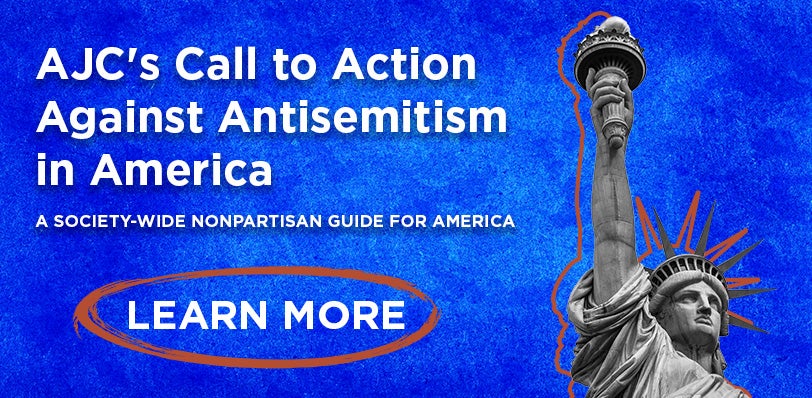According to AJC’s State of Antisemitism in America 2024 Report, 90% of U.S. adults believe “antisemitism affects society as a whole; everyone is responsible for combating it.” Interfaith and intergroup voices are critical. So are the words and actions of religious institutions, including churches, mosques, temples, and other places of worship that support the practice of religious beliefs.
Particularly now, as antisemitism threatens the well-being of the Jewish community with renewed vigor after the horrific attacks on October 7, 2023 – and the subsequent war between Hamas and Israel – the American Jewish community cannot fight antisemitism alone. It requires leaders and people of goodwill, from religious, ethnic, and racial communities across the ideological spectrum, to join in the fight. Non-Jewish voices need to raise awareness that antisemitism is not just a Jewish problem but an assault on the core values of pluralism, freedom, and democracy that Americans hold dear.
Please note that the suggestions offered below are not exhaustive. There is always more that can be done.
Understanding Antisemitism
Recognize antisemitic tropes, stereotypes, and terms | American Jewish Committee (AJC) created Translate Hate, a visual glossary to help identify different sources of antisemitism and expose antisemitic tropes, words, and symbols that often hide in plain sight. Part of being a strong ally is constant education. Translate Hate is a useful tool for new and longtime allies of the Jewish community. In fact, it inspired AJC’s Chinese-American partners, the C100, to make their own glossary of anti-Asian hate words, language, and tropes. For more information on how antisemitism has changed over time and what it looks like today, refer to AJC’s short, animated film called “What is antisemitism?”.
Learn more about Jewish people | According to AJC’s State of Antisemitism in America 2024 Report, four in 10 (40%) U.S. adults do not know someone who is Jewish. The same report reveals that when someone knows a Jew, they are far more likely to understand antisemitism. It is important for intergroup and interfaith partners to learn about who Jews are, in the same way it is important for the Jewish community to learn about other minorities.
Many people think Jews are just a religious group, yet Jews reflect diverse racial, ethnic, and national backgrounds and express their identity in a variety of religious and cultural ways. The majority practice Judaism, or at least are culturally associated with Jewish traditions, but others are not. Many Jews are secular or atheist, but they are still Jews. Refer to AJC’s short, animated film called “Who are Jews?” to better understand Jewish history and identity.
Understand the Jewish connection to Israel | According to AJC’s State of Antisemitism in America 2024 Report, 81% of Jews say caring about Israel is an important part of how they think about their Jewish identities. Many American Jews feel a historical, religious, or cultural connection to Israel, regardless of politics. Judaism as a religion is integrally tied to the land, to the city of Jerusalem, and other holy sites. From ancient times, Jewish history centered around the land of Israel, and Jews have lived continuously in the area.
Coming out of two millennia of persecution, not least the Holocaust, many Jews see Israel as the only place where they can live free from fear and persecution. Hamas’ brutal attacks against Israel on October 7, 2023, the most deadly against the Jewish people since the Holocaust, have reopened deep wounds for many in the Jewish community. Leaders in civil society should be sensitive to these concerns, which are exacerbated by surging global antisemitism and often guised in the language of criticism of Israel.
Targeting Jews, Jewish institutions or their houses of worship because of their connection to or support of the Jewish state is a form of antisemitism. When Jews face double standards, like being asked for their position on the Israel-Palestinian conflict before being included in social movements or political groups when no other ethnic or religious group is asked about their connections to another country, that can be antisemitism.
Responding to Antisemitism
Issue unequivocal condemnations | One of the most impactful ways partners can help respond to antisemitism is to use their collective voice to raise awareness and show allyship through public statements or social media messages after an incident occurs. Normalization occurs when antisemitism is ignored, downplayed, or diluted, and it can happen when those in a position of influence or authority fail to name and condemn antisemitism. Influential figures have a critical role to play in responding to antisemitic incidents and setting a positive “tone from the top,” that makes clear that antisemitism is not tolerated. Condemnation can take many forms, including public statements. Such statements of condemnation should come immediately after an incident and should:
- Specifically name and condemn antisemitism when it occurs, even while acknowledging the rights to free speech and the possibility of growth and change on the part of offenders.
- Counter toxic stereotypes and false narratives. Many minorities feel misrepresented in the media or society. This commonality can deepen sensitivities and cement bonds.
- Offer pathways forward, including resources for victims, that can help the community heal while also proactively addressing antisemitism by generating improved understanding about Jewish history, identity, and heritage.
Support partners in need | AJC’s State of Antisemitism in America 2024 Report found that 90% of Americans believe antisemitism affects society as a whole, and yet, in many instances, Jews feel as though hatred of them is ignored, discounted, or not taken as seriously as other forms of hate and bigotry. Condemnations of incidents are important, but so are messages of solidarity to let Jews know that they are not alone. When an antisemitic attack occurs, public messages of solidarity and support from partners are deeply appreciated. Partners speaking out loudly and clearly does not only engender goodwill toward the Jewish community, but it also raises vital awareness of hate in America more broadly. Those who hate Jews are likely to hate other minority groups and pose a threat to our democracy. This also applies to online antisemitism where non-Jewish voices calling out blatant or subtle hate can prevent dissemination and highlight dangerous trends.
Be alert to antisemitism within trusted spaces | Leaders of religious, ethnic, and racial groups should avoid coalitions that exclude Jews, deny the right of Jews to self-determination in their ancestral homeland, or demonize the Jewish state. Anti-Israel statements and actions are not always, but can be a form of antisemitism, and partners should have a nuanced and balanced understanding of the State of Israel and the people who live there. For a fuller picture of the various forms of antisemitism, please consider the International Holocaust Remembrance Alliance (IHRA) Working Definition of Antisemitism, which is a consensus definition used by over 1,000 entities and institutions globally, for use as an educational tool.
It is essential for Jews and others to acknowledge that criticism of Israel or the actions of Jewish individuals or groups is not on its face antisemitic, but to also note that there are times when the issue of Israel is weaponized against Jews – all must be intentional and informed about when and how we identify antisemitism. No state, institution or individual is beyond criticism, but when rhetoric crosses the line or targets something simply because it is Jewish, then people of good will must speak out.
Increase awareness and reporting of hate crimes | Many communities lack understanding about the threat posed by the underreporting of hate crimes, why it occurs, and the impact. The FBI’s 2024 Hate Crimes Statistics report highlights gross underreporting of hate crimes in cities across the U.S., including dozens of cities with 100,000 or more residents. If we do not understand the extent of the problem, effective solutions will continue to evade us. Leading a conversation about efforts to improve hate incident reporting, increase trust, and raise awareness about what constitutes a hate crime can bring vigilance and action. Because of a diverse coalition of support, important legislation like the Jabara-Heyer NO HATE Act, which incentivizes local law enforcement agencies to report hate crimes, was passed by Congress and signed into law. Diverse coalitions can engage in joint advocacy to motivate local law enforcement agencies to report hate crimes or help push Congress to appropriate at least $15 million in funds to help improve reporting of and response to hate crimes, and to stand up hate crime prevention initiatives such as hate crime hotlines.
Acknowledge that antisemitism is not just a problem for Jews | When an antisemitic incident occurs, voices beyond the Jewish community need to raise awareness that antisemitism is not just a Jewish problem but an assault on the core values of pluralism, freedom, and democracy that Americans hold dear. In this video, “Where There’s Hope,” American Jews and allies of the Jewish community reflect on the importance of everyone taking a stand against anti-Jewish hate, noting that “if it happens to one of us, it happens to all of us.”
Preventing Antisemitism
Raise awareness | Civil society is one of the most important factors in lowering the levels of antisemitism in the U.S. Non-Jewish voices have a unique ability to be heard when explaining what antisemitism is and why it is a societal problem. We are more likely to accept information when it comes from someone we know and trust. Further, if civil society, including faith and ethnic leaders, decries all forms of antisemitism, does not ignore, or minimize it, and pushes antisemites to the fringes of society, America will be a safer place not only for Jews, but for everyone.
Build personal connections | We must work to prevent antisemitism by rebuilding relationships and strengthening trust between all groups. AJC’s State of Antisemitism in America 2024 Report found that 81% of those who know someone Jewish say they have heard the term “antisemitism” and know what it means, compared with 52% who do not know someone who is Jewish. Eighty one percent who know someone who is Jewish say antisemitism is a problem in the U.S. today, compared with 58% who do not know anyone Jewish. And 67% of those who know someone who is Jewish, compared to 47% who do not, say antisemitism in the U.S. has increased over the past five years. Regular and sustained engagement is essential to build a foundation of goodwill. The following recommendations can help build personal relationships:
- Visit a synagogue and invite Jews to visit and speak at your house of worship. Attending a service or touring a house of worship helps understand a religious community’s ritual and practice in a practical, tangible way.
- Learn about each other. Leaders should not assume that there is universal knowledge and understanding of other communities. Teaching the basic “anatomy” of partners (e.g., titles of religious leaders, respectful protocol) can be helpful. Resources like AJC’s Short Guide to Jewish Religion and Culture can be useful.
- Facilitate reciprocal training opportunities. Jews and Jewish organizations should offer or connect partners with trainings, tools, and best practices to help them understand how Jew-hatred, scapegoating, and conspiracies are part and parcel of other forms of hate and prejudice. We all need to be open to learning about other communities’ sensitivities and experiences with hate, discrimination, and bias.
- Partner with AJC to plan trainings on how to recognize antisemitism, raise awareness, and address it using a variety of tools. AJC has planned similar trainings for elected officials, corporations, sports teams, higher education institutions, and nonprofits. To schedule a training, contact trainings@ajc.org.
Celebrate each other’s cultures | Proactively reach out to partners to acknowledge important dates, holidays, and anniversaries for their community. Be especially mindful of events that reinforce your communities’ ties with the partners you are reaching out to. Each May marks Jewish American Heritage Month, which, by broadening appreciation of Jewish American heritage, serves as a mechanism to counter antisemitism. Partners can help the Jewish community celebrate this month, and Jews should seek to engage with faith partners within diverse communities during Hispanic Heritage Month, Black History Month, Asian American and Pacific Islander Heritage Month, and so on.
Seek opportunities for joint advocacy | AJC’s State of Antisemitism in America 2024 Report found that the vast majority of American Jews (95%) and U.S. adults (92%) say it is important for Jewish communities and other religious and ethnic communities to increase cooperation with each other.
Joint advocacy strengthens bonds of partnership.
- Organize political empowerment workshops. Share best practices employed by various communities, from political advocacy efforts of diaspora communities, to how to be an effective advocate in the U.S., and the benefits of building strong coalitions.
- Issue statements of support for each community if an incident arises at either the national or local level. Consider the power of joint statements in sending a stronger message and reaching a broader audience.
- Conduct joint meetings and/or send joint letters. Leverage coalitions in letters to elected officials. An example is an appeal to the mayor’s office to designate a point person to address hate crimes.
- Collaborate in outreach to state/local government. With State legislatures and City Councils, engage existing caucuses (Jewish Caucus, Latino Caucus, etc.) by hosting briefings or events that may also bring in partners. Similarly, consider supporting the establishment or work of coalition-inspired caucuses (Black-Jewish, Latino-Jewish, etc.).
Include Jews in ethnic studies curricula | According to AJC’s State of Antisemitism in America 2023 Report, 72% of Americans believe that Jewish studies should be included by state and local governments in ethnic studies and/or history curricula in public schools. When coalition partners voice that Jews, Jewish history and contribution to America, Jewish diversity, and contemporary antisemitism are important, those in power are more likely to listen. Racism, antisemitism, and discrimination are an important part of our history, and our children should learn from our mistakes as we continue to strive to be a more perfect union.
Promote security to protect minority communities | The Department of Homeland Security’s Nonprofit Security Grant Program provides funds to train staff and harden physical security to protect minority affiliated institutions and houses of worship. Helping to raise awareness of these grants and promoting participation among all eligible groups helps prevent violence not just against Jews and Jewish institutions, but against all faith and ethnic groups.


